- Home
- Evelyn Waugh
Vile Bodies Page 5
Vile Bodies Read online
Page 5
“That’s Archie Schwert,” said Miss Mouse to Miss Brown. “Isn’t he too clever?”
“Is he?” said Miss Brown, who would have liked a drink, but didn’t know quite how to set about it. “You are lucky to know such amusing people, Mary darling. I never see anyone.”
“Wasn’t the invitation clever? Johnnie Hoop wrote it.”
“Well, yes, I suppose it was. But you know, was it dreadful of me, I hadn’t heard of any of the names.”*
“My dear, of course you have,” said Miss Mouse, feeling somewhere in her depths—those unplumbed places in Miss Mouse’s soul—a tiny, most unaccustomed flicker of superiority; for she had gone through that invitation word by word in papa’s library some days ago and knew all about it.
She almost wished in this new mood of exaltation that she had come to the party in fancy dress. It was called a Savage party, that is to say that Johnnie Hoop had written on the invitation that they were to come dressed as savages. Numbers of them had done so; Johnnie himself in a mask and black gloves represented the Maharanee of Pukkapore, somewhat to the annoyance of the Maharajah, who happened to drop in. The real aristocracy, the younger members of those two or three great brewing families which rule London, had done nothing about it. They had come on from a dance and stood in a little group by themselves, aloof, amused but not amusing. Pit-a-pat went the heart of Miss Mouse. How she longed to tear down her dazzling frock to her hips and dance like a Bacchante before them all. One day she would surprise them all, thought Miss Mouse.
There was a famous actor making jokes (but it was not so much what he said as the way he said it that made the people laugh who did laugh). “I’ve come to the party as a wild widower,” he said. They were that kind of joke—but, of course, he made a droll face when he said it.
Miss Runcible had changed into Hawaiian costume and was the life and soul of the evening.
She had heard someone say something about an Independent Labour Party, and was furious that she had not been asked.
There were two men with a lot of explosive powder taking photographs in another room. Their flashes and bangs had rather a disquieting effect on the party, causing a feeling of tension, because everyone looked negligent and said what a bore the papers were, and how too like Archie to let the photographers come, but most of them, as a matter of fact, wanted dreadfully to be photographed and the others were frozen with unaffected terror that they might be taken unawares and then their mamas would know where they had been when they said they were at the Bicesters’ dance, and then there would be a row again, which was so exhausting, if nothing else.
There were Adam and Nina getting rather sentimental.
“D’you know,” she said, pulling out a lump, “I’d quite made up my mind that your hair was dark.” Archie Schwert, pausing with a bottle of champagne, said, “Don’t be so sadistic, Nina.”
“Go away, hog’s rump,” said Adam, in Cockney, adding, in softer tones, “Are you disappointed?”
“Well, no, but it’s rather disconcerting getting engaged to someone with dark hair and finding it’s fair.”
“Anyway, we aren’t engaged any more, are we—or are we?”
“I’m not sure that we’re not. How much money have you, Adam?”
“Literally, none, my dear. Poor Agatha had to pay for dinner as it was, and God knows what I’m going to do about Lottie Crump’s bill.”
“Of course, you know—Adam, don’t fall asleep—there’s always papa. I believe he’s really much richer than he looks. He might give us some money until your books start paying.”
“You know, if I wrote a book a month I should be free of that contract in a year… I hadn’t thought of that before. I don’t at all see why I shouldn’t do that, do you?… or do you?”
“Of course not, darling. I’ll tell you what. We’ll go down and see papa tomorrow, shall we?”
“Yes, that would be divine, darling.”
“Adam, don’t go to sleep.”
“Sorry, darling, what I meant was that that would be divine.”
And he went to sleep for a little, with his head in her lap.
“Pretty as a picture,” said Archie, in Cockney, passing with a bottle of champagne in his hand.
“Wake up, Adam,” said Nina, pulling out more hair. “It’s time to go.”
“That would be divine… I say, have I been asleep?”
“Yes, for hours and hours. You looked rather sweet.”
“And you sat there… I say, Nina, you are getting sentimental… Where are we going?”
There were about a dozen people left at the party; that hard kernel of gaiety that never breaks. It was about three o’clock.
“Let’s go to Lottie Crump’s and have a drink,” said Adam.
So they all got into two taxicabs and drove across Berkeley Square to Dover Street. But at Shepheard’s the night porter said that Mrs. Crump had just gone to bed. He thought that Judge Skimp was still up with some friends; would they like to join them? They went up to Judge Skimp’s suite, but there had been a disaster there with a chandelier that one of his young ladies had tried to swing on. They were bathing her forehead with champagne; two of them were asleep.
So Adam’s party went out again, into the rain.
“Of course, there’s always the Ritz,” said Archie. “I believe the night porter can usually get one a drink.” But he said it in the sort of voice that made all the others say, no, the Ritz was too, too boring at that time of night.
They went to Agatha Runcible’s house, which was quite near, but she found that she’d lost her latchkey, so that was no good. Soon someone would say those fatal words, “Well, I think it’s time for me to go to bed. Can I give anyone a lift to Knightsbridge?” and the party would be over.
But instead a little breathless voice said, “Why don’t you come to my house?”
It was Miss Brown.
So they all got into taxicabs again and drove rather a long way to Miss Brown’s house. She turned on the lights in a somber dining room and gave them glasses of whiskey and soda. (She turned out to be rather a good hostess, though overzealous.) Then Miles said he wanted something to eat, so they all went downstairs into a huge kitchen lined with every shape of pot and pan and found some eggs and some bacon and Miss Brown cooked them. Then they had some more whiskey upstairs and Adam fell asleep again. Presently Vanburgh said, “D’you mind if I use the telephone? I must just send the rest of my story to the paper.” Miss Brown took him to a study that looked almost like an office, and he dictated the rest of his column, and then he came back and had some more whiskey.
It was a lovely evening for Miss Brown. Flushed with successful hospitality, she trotted from guest to guest, offering here a box of matches, there a cigar, there a fruit from the enormous gilt dishes on the sideboard. To think that all these brilliant people, whom she had heard so much about, with what envy, from Miss Mouse, should be here in papa’s dining room, calling her “my dear” and “darling.” And when at last they said they really had to go, Miss Runcible said, “Well, I can’t go, because I’ve lost my latchkey. D’you mind awfully if I sleep here?”
Miss Brown, her heart in her mouth, but in the most natural way possible, said, “Of course not, Agatha darling, that would be divine.”
And then Miss Runcible said, “How too divine of you, darling.”
Rapture!
At half past nine the next morning the Brown family came down to breakfast in the dining room.
There were four quiet girls (of whom the Miss Brown who had given the party was the youngest), their brother worked in the motor shop and had had to get off early. They were seated at the table when their mama came down.
“Now, children,” she said, “do try to remember to talk to your father at breakfast. He was quite hurt yesterday. He feels out of things. It’s so easy to bring him into the conversation if you take a little trouble, and he does so enjoy hearing about everything.”
“Yes, Mama,” they said. “We do t
ry, you know.”
“And what was the Bicesters’ dance like, Jane?” she said, pouring out some coffee. “Did you have a good time?”
“It was just too divine,” said the youngest Miss Brown.
“It was what, Jane?”
“I mean it was lovely, Mama.”
“So I should think. You girls are very lucky nowadays. There were not nearly so many dances when I was your age. Perhaps two a week in the season, you know, but none before Christmas ever.”
“Mama.”
“Yes, Jane.”
“Mama. I asked a girl to stay the night.”
“Yes, dear. When? We’re rather full up, you know.”
“Last night, Mama.”
“What an extraordinary thing to do. Did she accept?”
“Yes, she’s here now.”
“Well… Ambrose, will you tell Mrs. Sparrow to put on another egg?”
“I’m very sorry, my lady, Mrs. Sparrow can’t understand it, but there are no eggs this morning. She thinks there must have been burglars.”
“Nonsense, Ambrose, who ever heard of burglars coming into a house to steal eggs?”
“The shells were all over the floor, my lady.”
“I see. That’s all, thank you, Ambrose. Well, Jane, has your guest eaten all our eggs too?”
“Well, I’m afraid she has… at least… I mean…”
At this moment Agatha Runcible came down to breakfast. She was not looking her best really in the morning light.
“Good morning, all,” she said in Cockney. “I’ve found the right room at last. D’you know, I popped into a study or something. There was a sweet old boy sitting at a desk. He did look surprised to see me. Was it your papa?”
“This is Mama,” said Jane.
“How are you?” said Miss Runcible. “I say, I think it’s quite too sweet of you to let me come down to breakfast like this.” (It must be remembered that she was still in Hawaiian costume.) “Are you sure you’re not furious with me? All this is really much more embarrassing for me, isn’t it, don’t you think… or don’t you?”
“Do you take tea or coffee?” at last Jane’s mother managed to say. “Jane, dear, give your friend some breakfast.” For in the course of a long public life she had formed the opinion that a judicious offer of food eased most social situations.
Then Jane’s father came in.
“Martha, the most extraordinary thing!… I think I must be losing my reason. I was in my study just now going over that speech for this afternoon, when suddenly the door opened and in came a sort of dancing Hottentot woman half naked. It just said, ‘Oh, how shy-making,’ and then disappeared, and… oh…” For he had suddenly caught sight of Miss Runcible “… oh… how do you do?… How…?”
“I don’t think you have met my husband before.”
“Only for a second,” said Miss Runcible.
“I hope you slept well,” said Jane’s father desperately. “Martha never told me we had a guest. Forgive me if I appeared inhospitable… I—er… Oh, why doesn’t somebody else say something?”
Miss Runcible, too, was feeling the strain. She picked up the morning paper.
“Here’s something terribly funny,” she said, by way of making conversation. “Shall I read it to you?
“ ‘Midnight Orgies at No. 10.’ My dear, isn’t that divine? Listen, ‘What must be the most extraordinary party of the little season took place in the small hours of this morning at No. 10 Downing Street. At about 4 a.m. the policemen who are always posted outside the Prime Minister’s residence were surprised to witness’—Isn’t this too amusing—‘ the arrival of a fleet of taxis, from which emerged a gay throng in exotic fancy dress’—How I should have loved to have seen it. Can’t you imagine what they were like?—‘the hostess of what was described by one of the guests as the brightest party the Bright Young People have yet given, was no other than Miss Jane Brown, the youngest of the Prime Minister’s four lovely daughters. The Honorable Agatha…’ Why, what an extraordinary thing… Oh, my God!”
Suddenly light came flooding in on Miss Runcible’s mind as once when, in her debutante days, she had gone behind the scenes at a charity matinee, and returning had stepped through the wrong door and found herself in a blaze of floodlights on the stage in the middle of the last act of Othello. “Oh, my God!” she said, looking round the Brown breakfast table. “Isn’t that just too bad of Vanburgh. He’s always doing that kind of thing. It really would serve him right if we complained and he lost his job, don’t you think so, Sir James… or… don’t you?”
Miss Runcible paused and met the eyes of the Brown family once more.
“Oh, dear,” she said, “this really is all too bogus.”
Then she turned round and, trailing garlands of equatorial flowers, fled out of the room and out of the house to the huge delight and profit of the crowd of reporters and Press photographers who were already massed round the historic front door.
Five
Adam woke up feeling terribly ill. He rang his bell once or twice, but nobody came. Later he woke up again and rang the bell. The Italian waiter appeared, undulating slightly in the doorway. Adam ordered breakfast. Lottie came in and sat on his bed.
“Had a nice breakfast, dear?” she said.
“Not yet,” said Adam. “I’ve only just woken up.”
“That’s right,” said Lottie. “Nothing like a nice breakfast. There was a young lady for you on the ’phone, but I can’t remember what it was she said at the minute. We’ve all been upside down this morning. Such a fuss. Had the police in, we have, ever since I don’t know what time, drinking up my wine and asking questions and putting their noses where they’re not wanted. All because Flossie must needs go and swing on the chandelier. She never had any sense, Flossie. Well, she’s learned her lesson now, poor girl. Whoever heard of such a thing—swinging on a chandelier. Poor Judge What’s-his-name is in a terrible state about it. I said to him it’s not so much the price of the chandelier, I said. What money can make, money can mend, I said, and that’s the truth, isn’t it, dear? But what I mind, I said, is having a death in the house and all the fuss. It doesn’t do anyone any good having people killing theirselves in a house like Flossie did. Now what may you want, my Italian queen?” said Lottie as the waiter came in with a tray, the smell of kippers contending with nuit de Noël rather disagreeably.
“Gentleman’s breakfast,” said the waiter.
“And how many more breakfasts do you think he wants, I should like to know? He’s had his breakfast hours ago while you were powdering your nose downstairs, haven’t you, dear?”
“No,” said Adam, “as a matter of fact, no.”
“There, do you hear what the gentleman says? He doesn’t want two breakfasts. Don’t stand there wiggling your behind at me. Take it away quick or I’ll catch you such a smack… That’s just the way—once you get the police in everyone gets all upset. There’s that boy brings you two breakfasts and I dare say there’s some poor fellow along the passage somewhere who hasn’t had any breakfast at all. You can’t get anywhere without a nice breakfast. Half the young fellows as come here now don’t have anything except a cachet Faivre and some orange juice. It’s not right,” said Lottie, “and I’ve spoken to that boy about using scent twenty times if I’ve spoken once.”
The waiter’s head appeared, and with it another wave of nuit de Noël.
“If you please, madam, the inspectors want to speak to you downstairs, madam.”
“All right, my little bird of paradise, I’ll be there.”
Lottie trotted away and the waiter came sidling back bearing his tray of kippers and leering at Adam with a horrible intimacy.
“Turn on my bath, will you, please,” said Adam.
“Alas, there is a gentleman asleep in the bath. Shall I wake him?”
“No, it doesn’t matter.”
“Will that be all, sir?”
“Yes, thank you.”
The waiter stood about fingering the b
rass knobs at the end of the bed, smiling ingratiatingly. Then he produced from under his coat a gardenia, slightly browned at the edges. (He had found it in an evening coat he had just been brushing.)
Would the signor perhaps like a buttonhole?… Madame Crump was so severe… it was nice sometimes to be able to have a talk with the gentlemen…
“No,” said Adam. “Go away.” For he had a headache.
The waiter sighed deeply, and walked with pettish steps to the door; sighed again and took the gardenia to the gentleman in the bathroom.
Adam ate some breakfast. No kipper, he reflected, is ever as good as it smells; how this too earthly contact with flesh and bone spoiled the first happy exhilaration; if only one could live, as Jehovah was said to have done, on the savor of burned offerings. He lay back for a little in his bed thinking about the smells of food, of the greasy horror of fried fish and the deeply moving smell that came from it; of the intoxicating breath of bakeries and the dullness of buns… He planned dinners of enchanting aromatic foods that should be carried under the nose, snuffed and thrown to the dogs… endless dinners, in which one could alternate flavor with flavor from sunset to dawn without satiety, while one breathed great draughts of the bouquet of old brandy… Oh for the wings of a dove, thought Adam, wandering a little from the point as he fell asleep again (everyone is liable to this ninetyish feeling in the early morning after a party).
Presently the telephone by Adam’s bed began ringing.
“Hullo, yes.”
“Lady to speak to you… Hullo, is that you, Adam?”
“Is that Nina?”
“How are you, my darling?”
“Oh, Nina…”
“My poor sweet, I feel like that, too. Listen, angel. You haven’t forgotten that you’re going to see my papa today, have you… or have you? I’ve just sent him a wire to say that you’re going to lunch with him. D’you know where he lives?”

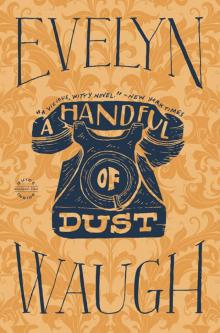 A Handful of Dust
A Handful of Dust Complete Stories of Eveyln
Complete Stories of Eveyln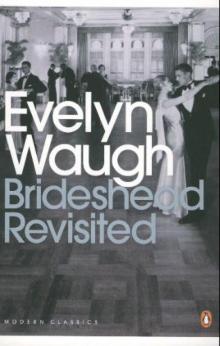 Brideshead Revisited
Brideshead Revisited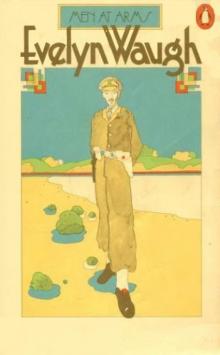 Men at Arms
Men at Arms Black Mischief
Black Mischief When the Going Was Good
When the Going Was Good Officers and Gentlemen
Officers and Gentlemen Helena
Helena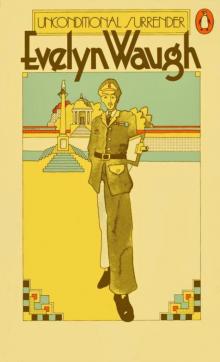 Unconditional Surrender
Unconditional Surrender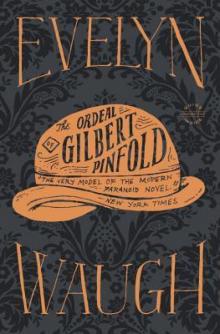 The Ordeal of Gilbert Pinfold
The Ordeal of Gilbert Pinfold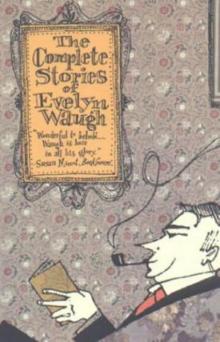 The Complete Stories Of Evelyn Waugh
The Complete Stories Of Evelyn Waugh